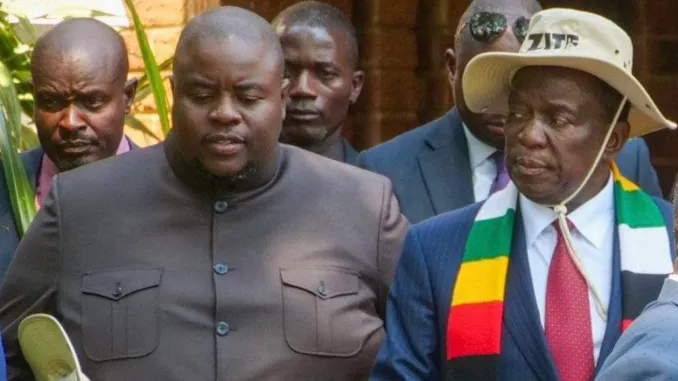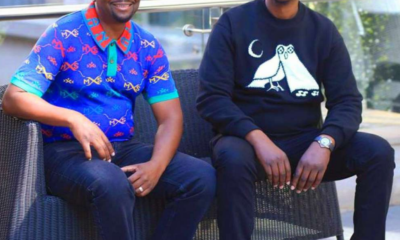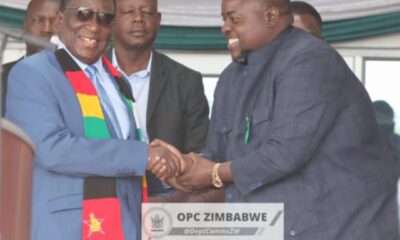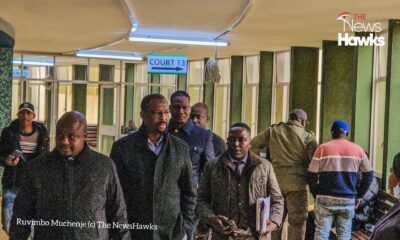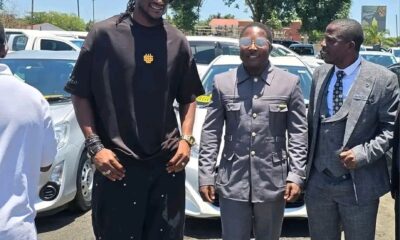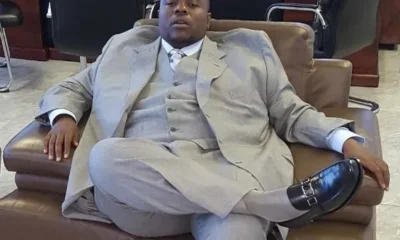OWEN GAGARE
IN all his leaked audios when talking to his business associates Mike Chimombe and Moses Mpofu before their bitter fallout, local tycoon Wicknell Chivayo always maintained one thing — “be patient guys, more money is coming”: And indeed it has come.
Chivayo, who is close to President Emmerson Mnangagwa and other top officials, was paid more — US$7 million from Treasury on 25 June 2024.
The payment was confirmed to The NewsHawks by well-placed Treasury sources.
Chivayo has several tenders with government and state institutions, including police and immigration.
He has been trying to close a new tender with the army, but he burnt his fingers, insiders say.
In another revealing audio first leaked to The NewsHawks on 9 July, Chivayo maintains the same narrative — more money is coming — with Chimombe who then mentions they had signed another US$17 million without problems even though their relations were beginning to sour and become acrimonious.
An informed Treasury source said: “Chivayo was paid US$7 million on Tuesday, 25 June 2024, into his South African account. The payment was characterised by problems because the PS (permanent secretary) George Guvamatanga was refusing to pay.
“The full amount was supposed to be US$27 million. This was for the Zec or elections tender. It wasn’t for the army as people are saying. In fact, he burnt his fingers on the military supply bid. The deal didn’t work. It’s a story for another day.”
Sources say Guvamatanga had initially refused to pay saying there is no money.
The permanent secretary had also tried to dillydally paying some invoices of people close to Mnangagwa and that got him into serious trouble, which explains one media report around that period, saying he had been fired and reinstated by the President.
Guvamatanga ended up saying he was going to pay using drought relief money.
Zimbabwe recently received US$31.8 million from African Risk Capacity, an arm of the African Union, as part of an insurance payout for the devastation the country suffered from an El Niño-induced drought.
The sources said latest payment to Chivayo went through local channels into his South African Bank where he has been receiving money from the mega US$100 million Zimbabwe Electoral Commission (Zec) tender, which dramatically changed his life.
In another voice note, Chivayo says he is now 10 times richer due to the Zec deal.
While his erstwhile friends are now languishing in remand prison for weeks on end over a botched US$88 million Presidential Goat Scheme deal in which they are accused of fraud involving US$7.7 million, Chivayo is enjoying himself outside, getting more money to continue with his colourful conspicuous consumption lifestyle — that is buying cars, designer clothes and exclusive brands, while making donations.
He has donated cars and cash amounting to US$3 million. To cover his back and protect high-profile government officials involved, Chivayo has now thrown Chimombe and Mpofu under the bus, while he got protection from the top.
Chimombe and Mpofu are facing more corruption and fraud charges for allegedly submitting false documents in a US$9 million Harare City Council street lights tender.
Insiders say Chivayo has not been arrested because of his close links with Mnangagwa and also a result of the fear that he might spill the beans if cornered — meaning to protect senior officials.
Businesssman Wicknell Chivayo Besides, there are legal complications which the Zimbabwe Anti-Corruption Commission (Zacc) ran into after its chairperson Michael Reza appeared enthusiastic to deal with Chivayo and others.
One lawyer explained to The NewsHawks: “First, Chivayo is not party to the signed agreements as he was operating from behind the scenes. “He did not sign any agreement with the South African election materials supplier RenForm or anyone for that matter. Reform signed a deal with Zec and gold baron Pedzisayi “Scott” Sakupwanya’s Better Brands Security (Pvt) Ltd.
“Although it is known Chivayo, Chimombe, Mpofu and Sakupwanya were carried by Better Brands, legally it is hard to prove it.
“Secondly, Zacc is relying on the Reserve Bank of Zimbabwe’s Financial Intelligence Unit (FIU) to investigate Chivayo because they want to charge him with money laundering. This takes time, but that’s not the real problem. The actual problem is you can’t use the FIU’s findings in court.
“Thirdly, there is the issue that Zacc has no jurisdiction in South Africa where the corruption was taking place in terms of payments and bribery and Cabinet Martin Rushwaya, lawyer. Zacc through the National Prosecuting Authority, needs mutual legal assistance with South African institutions to investigate the issue. There are also several issues which arise that make it difficult for Zacc to tackle Chivayo head on. Of course politics is the biggest problem. He has compromised too many top officials and arresting him can be self-defeating; open a Pandora’s Box.”
The Zec tender scandal is far wider and deeper than initially thought: It involves more than US$100 million in public funds looted through fraudulent and usurious pricing of electoral material supplies during last year’s flawed elections.
The various supplies to Zec were provided by Ren-Form CC and its agents, including Better Brands Security, a local company. Prices were inflated by up to 235% and in some cases far above that.
Key players in the US$100 million deal were Zec chairperson Priscilla Chigumba, chief electoral officer Utoile Silaigwana, chief procurement officer Robson Changachirere, Chivayo, Mpofu, Sakupwanya and Chimombe, Central Intelligence Organisation Director-General Isaac Moyo, Chief Secretary to the President Everson Chatambudza, Ren-Form international sales executive Angus Carlaw and the company chief executive Thomas Michel du Sart.
The initial dossier showed that the deal had a US$40 million component which was about supplying biometric voter registration (BVR) kits and other things.
But this tender was only for the supply, installation, training and support services to meet Zec’s requirements, especially BVR kits as well as software to ensure registration and update of the voter management system ahead of the 2023 elections.
That cost US$40 million, delivered in two parts. This is the initial amount which The NewsHawks used when it broke the story.
The first total tranche under which various payments were made amounted to US$19 957 301.
However, invoices and payments attached to the corruption dossier now publicly available amount to US$69 million.
The US$40 million is part of the US$69 million cost.
The break down of the US$69 million comprises the following payments:
US$2 673 360;
US$4 919 592;
US$8 964 693.80;
US$3 544 526;
US$4 025 559;
US$4 126 500;
US$4 786 800;
US$5 000 000;
US$4 989 325.50;
US$3 946 626.50;
US$5 731 979.50;
US$5 907 123.30;
US$5 992 334; and US$4 513 218.
Besides this, there were other payments amounting to US$21 million for items such as canvas tents, ballot papers, solar lights and indelible ink marking pens for the elections.
Zec says money spent on importing material for the elections, including donations, was US$21 148 867.
This also entails materials like solar lights, tents, ballot papers and display kits for V11 forms.
However, documents show that the outlay on election materials included the US$69 million and US$21 million, bringing it to US$90 million.
But there were other transactions, for instance Zec’s order for 2 000 non-flushable toilets on the eve of the August 2023 elections at a cost of US$7.6 million.
The toilets, priced at an astronomical US$3 800 per unit when they retail for about US$300 in South Africa, were only delivered in April this year — eight months after the elections.
Zec also splurged US$5 million on gadgets to display voting returns, digital V11 polling station forms, for last August’s election, but those devices, bought at inflated prices, were only delivered months after the polls.
This brings the total amount of the deal to more than US$100 million. In the 2023 national budget presented in November 2022, Finance minister Mthuli Ncube allocated ZW$76 billion (US$116 million at the time) for the elections.
Fresh information thus shows the deal is worth about five times the amount which Zec says it spent.
The main actors in the deal have not yet been held accountable, although Zec officials, Chigumba, Silaigwana and Changachirere have been interviewed by Zacc.
Mpofu and Chimombe also surrendered themselves to Zacc, but were allowed to go without much ado.
Zacc says it is investigating the scandal, but its failure to swiftly deal with Chivayo has left it further discredited, with a massive reputational and credibility deficit.
Zec secretariat is headed by Silaigwana, the administrative and technical leader, as well as the accounting officer, who directly reports to the commission through Chigumba.
Zec has other departments that report directly to Silaigwana: Finance, Legal services, Office of the secretary to the commission, Internal Audit and Procurement Management Unit.
In this case, the most important section below Silaigwana was the procurement department headed by Changachirere. However, Chigumba is the overall boss.
In the Office of the President and Cabinet, the Chief Secretary to Cabinet Martin Rushwaya was key. At CIO, Moyo was central. Chivayo became the broker.
The NewsHawks has more details showing Zec worked closely with Chivayo, Chimombe and Mpofu despite its attempt to distance itself from them.
Zec is now desperately trying to wriggle out through legal technicalities, saying it has no contract with Chivayo, Chimombe and Mpofu.
Details show Chivayo, Mpofu, Chimombe and Sakupwanya were brokers and agents of the deal.
They only signed a contract with Ren-Form, a South African integrated digital communication and printing company, the supplier, as a partner, not Zec.
Zec also says the procurement process was followed to the letter and spirit. But facts show it was merely a formality.
The tender was given well ahead of the formal process, which was rendered an academic exercise.
The deal was sealed in February 2023 after Chigumba, accompanied by Chivayo and Mpofu, visited Ren-Form offices in Johannesburg located Corner Booysens and Trump Street, Selby.
Yet the official procurement process which Zec refers to in its statements denying any wrongdoing only started in April, ending in June.
This was after the first invoice was raised in February and payment the following month, March. In brief, this is what actually happened:
Chivayo, who is close to Chigumba and Moyo, as well as Mnangagwa, secretly and corruptly secured a brokerage role in the tender between Zec and Ren-Form for the supply of election materials, including biometric voter registration kits and other things, by leveraging his close relationships and contacts with the high-profile officials.
For Chivayo, everything was perfectly set while he was in a good position to get the deal. He was close to Chigumba, Moyo, Rushwaya and most importantly Mnangagwa.
Unable to contain his excitement, Chivayo now says Mnangagwa is firmly under his vicelike grip.
State officials, the Zanu PF youth league and information department have reacted angrily to this claim.
Because he does not have the technical knowledge or know-how on elections, electoral matters and material supplies, Chivayo invited Mpofu, who has an IT background and has dealt with Zec many times before, to be part of the deal.
Mpofu was involved in the 2018 elections and several others before going back to 2008. So his experience was valuable. After securing his position, Mpofu then brought in his friend, Chimombe, as they always hunt for tenders and work together.
However, there was a problem: money. In terms of the agreement between Ren-Form and Chivayo and others, each party was going to bear its own costs and expenses, including travel, preparation and submission of proposals, and all commitments and representations.
So enter gold baron Sakupwanya.
Because Chivayo and others had no money to fund their deal, Sakupwanya was roped in as the funder.
That is why Better Brands became the partner to Ren-Form, and signed the contract on 13 February 2023, 11 days after Chigumba, Chivayo and Mpofu had held Johannesburg meetings.
Chivayo did not have a cent at the time, although he wants to make it appear as if he always had money.
Prior to the Zec jackpot, Chivayo, who previously made money from state power utility Zesa tenders, was broke.
So Sakupwanya provided US$200 000 to fund the project. T his money — US$30 000 — was used for f lights for the delegation to meet Ren-Form in South Africa on 1 February 2023, US$80 000 for other costs and expenses and the US$90 000 balance to pay Chigumba’s overseas tuition fees and upkeep bills for her children.
In all this wheeling and dealing, Chigumba f irst held meetings with Chivayo, Mpofu and Chimombe, including at her Greendale home in Harare.
Eventually they travelled on 1 February 2023 to meet Ren-Form executives in Johannesburg to seal the deal. Chigumba travelled with her aid and child to Johannesburg, together with Chivayo and Mpofu, for a meeting the following day, 2 February 2023.
Together with Chivayo and Mpofu, Chigumba stayed at the upmarket 5-star luxury DaVinci Hotel and Suites on Nelson Mandela Square, Sandton Mall.
Chimombe did not attend the meeting as he was on the campaign trail for Zanu PF ahead of the 23/24 August 2023 general elections.
Sakupwanya was also not there due to other business commitments.
That is why on the photos currently circulating on social media — which provide critical and undeniable evidence to show Zec is wilfully lying that it does not have any dealings with the brokers — Chimombe and Sakupwanya are not there.
There is only Chivayo and Mpofu on some photos and Chivayo, Mpofu and Carlaw on others.
So on two critical accounts — whether it worked with Chivayo, Chimombe and Mpofu, and also if the procurement process and procedures were followed — Zec has been caught out lying.
While it deceitfully denies links with them, Zec worked closely with Chivayo, Chimombe and Mpofu.
The legal procurement process and all relevant procedures were not followed when the tender was given because a semblance of that only came after the agreement had been signed as a mere formality.
To ensure that everyone key was covered, one of Mnangagwa’s children — a lady named Chido Mnangagwa — was also brought in.
Chido is not prominent in public fora like her brothers, for instance Emmerson Jr and the twins, Sean and Collins, but she gave a brief interview to SABC during her father’s inauguration in 2018, saying: “I’m very excited, we are so proud of our dad — he has done a great job.”
With his proximity to Mnangagwa and having brought in his daughter, Chivayo had the situation under control, also given his connections with Chigumba, Moyo and Rushwaya.
So when he brought on board Mpofu, Chimombe and Sakupwanya, the team was complete. With agreements signed and behind the scenes arrangements in place, the jackpot had been hit.
